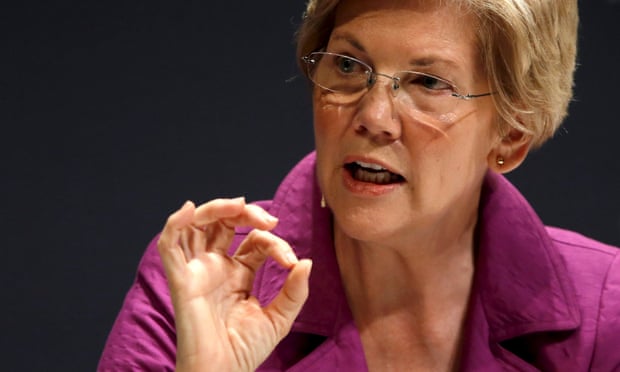Elizabeth Warren asks CDC to consider legal marijuana as alternative painkiller
The Massachusetts senator called for more research to be done on medical marijuana and prescription opioid addiction amid abuse and overdose epidemic
‘Opioid abuse is a national concern and warrants swift and immediate action,’ Senator Elizabeth Warren wrote in her letter to the CDC. Photograph: Jonathan Ernst/Reuters
Massachusetts senator Elizabeth Warren has asked the Centers for Disease Control and Prevention (CDC) to consider the role legal marijuana could play in the prescription opioid epidemic.
Warren asked for more research into medical marijuana and painkiller addiction in a letter to the CDC director, Thomas Friedan.
“Opioid abuse is a national concern and warrants swift and immediate action,” Warren wrote.
Her request comes as politicians, including the presidential nominees, search for the best response to the opioid epidemic.
The use of prescription opioids doubled between 2000 and 2014, according to the CDC. And Massachusetts experienced its highest number of unintentional opioid overdose deaths in 2014, with nearly 1,100 people succumbing to overdose deaths.
Warren applauded the CDC’s actions so far to curb the epidemic but called on the agency to look at whether medical marijuana could be an alternative painkiller.
She also urged the agency to quickly finalize its guidelines for prescribing opioids for chronic pain and called for increased collaboration between the CDC and other federal health agencies to determine the long-term effects of opioid use in children and the increased use of the powerful synthetic opioid fentanyl.
Nestled in with these recommendations is a call to consider the role of marijuana legalization in the crisis.
Specifically, Warren requested the agency to provide more information on “the use, uptake and effectiveness of medical marijuana as an alternative to opioids for pain treatment in states where it is legal”.
She also asked them to look into “the impact of the legalization of medical and recreational marijuana on opioid overdose deaths”.
Medical marijuana is illegal under federal law, which is a significant hurdle for any federal agency hoping to study its effects, and makes it impossible to prescribe through a pharmacist.
But using the plant for some medical purposes is legal in 23 states, including Massachusetts, plus Washington DC. Marijuana is also legal for recreational use in Colorado, Washington state, Oregon and Alaska.
Medical cannabis laws were tied with lower state-level opioid overdose death rates, according to a study published in the December 2014 issue of Journal of the American Medical Association. And hundreds of people in Massachusetts who are addicted to opioids are being treated with medical marijuana.
http://www.theguardian.com/us-news/...ren-medical-marijuana-painkiller-opioid-abuse






